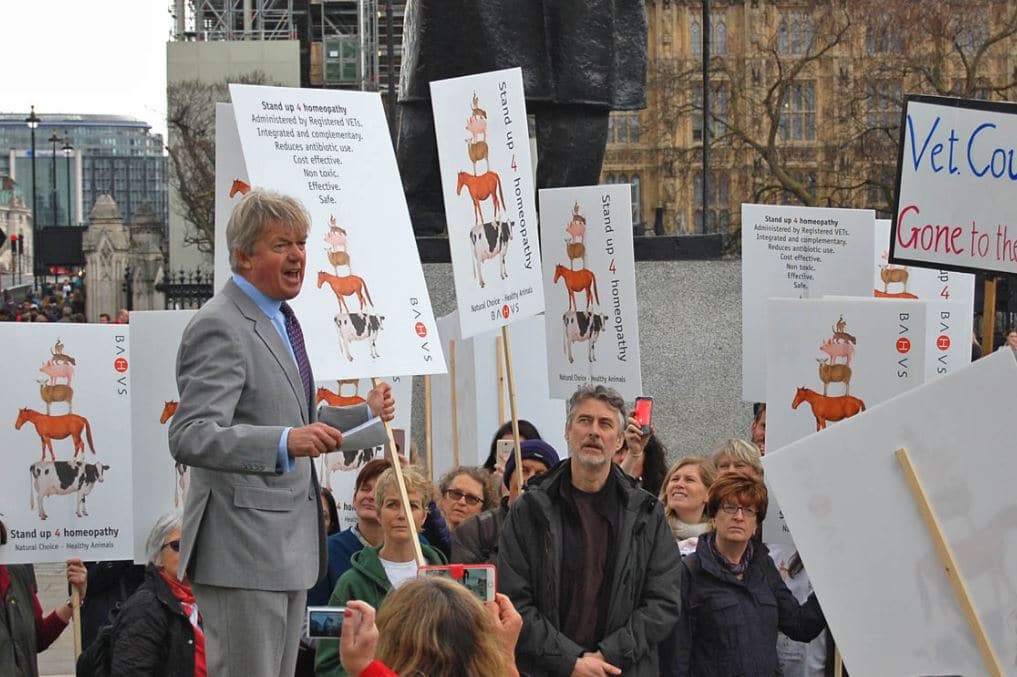Every day, in real life and on social media, we encounter a vocal antivaxxer brigade, evangelical proponents of grain free and raw meat diets, online stores selling magnetic therapy, and chiropractors, homeopaths and reiki healers promoting their businesses. This may sound pretty familiar to those involved in Skeptic societies. But I’m not a doctor. I’m a vet.
It comes as a surprise, even to those who have been discussing pseudoscience for years, that the use of alternative medicine and implausible products is as common in veterinary medicine as in human healthcare.
Over recent years, the aggressive promotion of alternative therapies to prevent and treat animal diseases has become widespread.
Conventional veterinary medicine is a victim of its own success. The fact that vaccination campaigns have been so effective means people are less aware of the dangers of diseases, and more concerned about the potential side effects of vaccines.
As with human medicine, conventional veterinary medicine is also a victim of its own success. The fact that national vaccination campaigns have been so effective against previously common dog diseases such as distemper and parvovirus means that people are less aware of the dangers of the diseases and more concerned about the potential side effects of the vaccines.
There is a widespread and very pervasive conspiracy theory that vets and pharmaceutical companies are promoting dangerous conventional medicines in order to make additional profit when pets become sick. In order to protect their profits, many of these groups believe vets and pharmaceutical companies are trying to suppress knowledge about effective and safe alternative medicines.
Such is the level of suspicion that the British Veterinary Association felt it necessary to issue a public statement to dispel the myth that vaccines are linked to autism in dogs.
Social media has undoubtedly played a role. Facebook groups act as echo chambers where medically implausible claims go unchallenged, and those who express different viewpoints are removed. Facebook groups containing thousands of UK pet owners discuss their mistrust of vets and the pharmaceutical industry. A common discussion point is that vaccines and many commercially available pet foods contain dangerous “chemicals” that make animals sick or cause illnesses such as cancer.

Members of these groups urge the use of “safer” alternative therapies such as homeopathy, reiki, Chinese medicine and chiropractic interventions. Anti-vaxxers recommend orally administered “like cures like” nosodes which they claim are a safe and effective alternative to conventional vaccines, and in some groups animal psychics even offer therapy via Facebook Messenger or phone. There are dog and cat groups containing thousands of members purely discussing what they believe to be ‘natural’ diets for animals, motivated by the supposedly dangerous content of commercially available dog and cat foods. Members of these groups champion unproven health benefits of feeding their pets on raw meat-based, grain-free, organic, or even vegan diets. Some of these raw diets have been shown to be a public health risk.
To add weight to the opinions of those who distrust conventional medicine, a small number of vets are very vocal advocates of alternative medicines, and have huge social media followings. Their clinics offer therapies including homeopathy and bioresonance, and the British Association of Homeopathic Veterinary Surgeons has multiple case reports of cancer cured by homeopathic treatments on their website. These vets have a dedicated following of animal owners who believe that they are whistleblowers speaking out against a corrupt profession who are in the pocket of ‘Big Pharma’, just as discredited ex-doctor Andrew Wakefield purported to do in human healthcare.
To address potential animal welfare harm caused by a small number of vets promoting anti-vaccination advice, homeopathy and other treatments with no scientific plausibility, the Royal College of Veterinary Surgeons (RCVS) published a position statement in November 2017. That statement advised that vets should only use complementary and alternative medicines in conjunction with appropriate treatment, so as not to cause animal suffering by replacing or delaying treatment. The statement went on to explain that homeopathy exists without a recognised body of evidence for its use and that it is not based on sound scientific principles. Such was the strength of opposition that protestors, led by an MP, marched outside the RCVS Headquarters and submitted a petition signed by over 11,000 members of the public, urging them to retract the statement.

Delaying or withholding effective treatments can cause animals to become more ill as a disease progresses. In humans, people argue (rightly or wrongly) that the placebo effect can very real and dramatic. However, there is no evidence that animals experience a psychological placebo effect when given ineffective remedies, most probably because they are unaware that they are receiving any treatment. Fascinatingly, as with parents of young children, owners may experience a ‘caregiver placebo effect’ whereby any improvement in the pet’s demeanour is attributed to the effectiveness of the treatment – rather than recognising that many animals with long term heath conditions such as arthritis have ‘good weeks’ and ‘bad weeks’ which are affected by a huge variety of factors.
In conditions such as osteoarthritis, substituting actual painkillers with implausible alternative therapies would lead to an animal experiencing avoidable pain. In cases of severe bacterial infection, death is a real risk if appropriate antibiotics are not administered in a timely manner.
Pet owners often fail to understand that delaying or withholding effective treatments can cause animals to become very ill, and that they could even be prosecuted if their animal suffers because they did not seek veterinary advice.
It is difficult to engage in constructive dialogue with people who believe that anyone with a different opinion is part of a conspiracy. Focussing purely on educational interventions and explaining statistics to anti-vaxxers seems to have little effect. Understanding how these beliefs form in the first place is key. Anti-science attitudes are often more closely tied to an individual’s personal values, and even their politics, than to their level of education. This means that epidemiologists and advocates of evidence based medicine will probably have to rely on the expertise and research of political science and social psychology to develop successful techniques or campaigns to influence animal owners and their decision making.

Adult humans can choose to ignore medical advice and elect to use unproven or dangerous alternatives to genuine medical treatment. However, animals are entirely dependent on their carers to make medical decisions for them. It is therefore unethical to force them to receive treatments that are implausible in place of proven treatments. They have no choice.
Over the coming weeks and months we will be discussing further the various alternative therapies and medicines commonly used in animals, and, importantly, we’ll look at how to engage with animal owners in a compassionate and constructive way to ensure animal welfare is not compromised.
After all, we must remember that we have a lot in common, as those who champion alternative medicine want the same outcome that we vets are striving for: happy, healthy pets.
The Skeptic would like to thank Zoe Belshaw for her contributions to this article.



